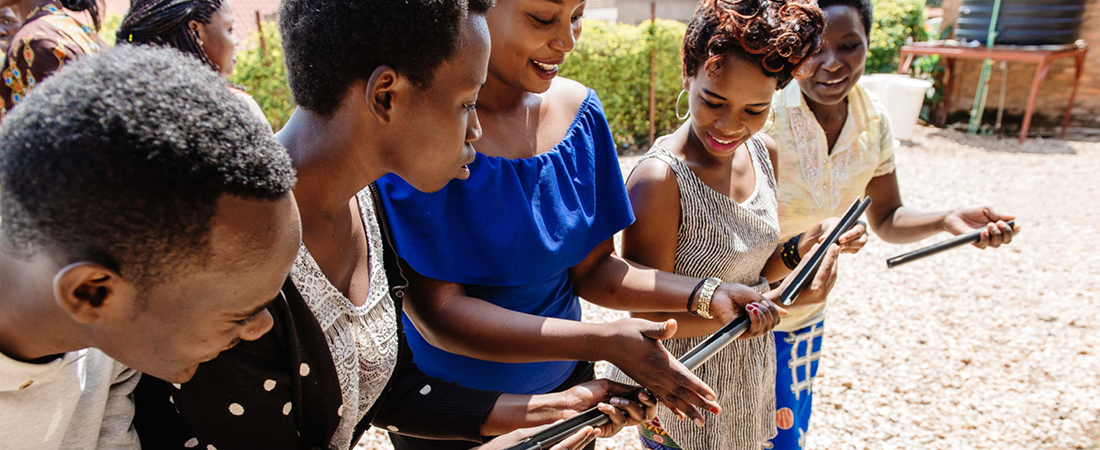EDC Youth Projects Featured in USAID Review on Soft Skills

A new publication about the importance of soft skills in creating effective workforce development programs highlights EDC’s youth engagement interventions in the Democratic Republic of the Congo, Djibouti, Liberia, Rwanda, Senegal, and Somalia, as well as references best practice from similar work in Honduras and the Philippines.
The review, Soft Skills and Youth Workforce Development in Sub-Saharan Africa, commissioned by USAID, examines the relationship between soft skills training and youth workforce development outcomes. It found that young people in Sub-Saharan Africa thrive when soft skills—defined as “cognitive, social, and emotional skills, behaviors, and personal qualities that help people to navigate their environment, relate well with others, perform well, and achieve their goals”—are integrated into basic education curriculum or technical vocational education and training programs.
The publication is important because it fills an existing gap in research literature, says Melanie Sany, EDC’s international youth and workforce development director.
“Little research has been done on the impact of soft skills training across a spectrum of youth populations in low-income, agricultural economies, as well as urban centers, and in contexts facing diverse challenges such as conflict, resource scarcity and subject to climate change,” says Sany. “This review shows just how impactful these programs are in a range of settings and why they are worthwhile investments.”
The population of Sub-Saharan Africa is the youngest in the world. Sany notes that the region’s stability and prosperity hinges upon whether youth can secure well-paid work, feel connected to community leaders, and develop innovative solutions to the inevitable social and economic challenges that will arise.
“Many young people in Sub-Saharan Africa have already shown themselves to be resilient and resourceful,” Sany says. “Soft skills training just reinforces their own assets and provides them with the tools to construct a better life for themselves and their communities.”
For 15 years, EDC has been integrating soft skills training into its workforce development programming in Sub-Saharan Africa, Southeast Asia, Central America, and Eastern Europe. In Sub-Saharan Africa alone, EDC’s programming has helped more than 500,000 youth develop essential work skills and be resilient, even in the face of shocks and stressors. EDC has been working with the governments of Djibouti, Senegal, and Rwanda to institutionalize soft skills content, curriculum, and training reforms in secondary education, technical vocational education and training, and higher education systems.
Among the review’s highlights:
- In Rwanda, youth participants on the Akazi Kanoze Youth Livelihoods Project demonstrated more confidence after completing a soft skills training that incorporated technical trade skills, financial literacy, and workplace safeguarding standards. Access to a combination of soft skills and business skills training was similarly shown to reduce existing national-level employment gender gaps.
- In Senegal, employers engaged with the Projet de l’amélioration des performances de travail et d’entreprenariat (APTE) reported greater job performance and job satisfaction with youth program participants than with non-APTE youth. Employers also indicated that they were more willing to offer employment to youth who attended soft skills training. Further, in partnership with APTE, the national secondary and technical vocation education and training systems are integrating soft skills learning and competency-based approaches at scale.
- In the Democratic Republic of the Congo, a midline evaluation on the Integrated Youth Development Activity indicated strong correlations between soft skills training and strengthened resilience for youth in conflict-affected communities.
- The authors of the USAID review also called out the success of the Liberia Advancing Youth Project and the Somalia Youth Livelihood Project, both of which integrated soft skills training as part of their larger youth development efforts.
- The review also notes the value of EDC’s Anchored Big Five Inventory (ABFI) tool, which has proved successful at measuring soft skills across cultures and systems and correcting for bias in self-reporting.
“So often in our youth workforce development work we see soft skills training be the catalyst for youth success in education, vocational training programs, entrepreneurial ventures, and employment. Seeing these successes featured as part of USAID’s comprehensive review is inspiring,” says Sany.